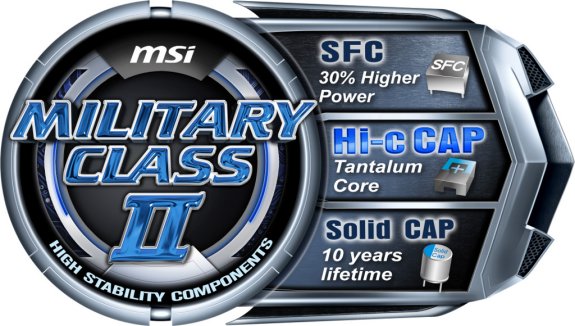
Posted on Monday, November 15 2010 @ 16:17 CET by Thomas De Maesschalck
MSI presents its Military Class II label, motherboards released under this brand will offer Hi-C CAP capacitors with tantalum core, Super Ferrite Chokes and SoliD CAPs. The first motherboards to have Military Class II will likely be MSI's upcoming Sandy Bridge boards.
This year MSI, the globally renowned graphics card and mainboard manufacturer, earned praise from professional media and consumers with the introduction of Military Class Components. Military Class Components quickly became synonymous with build quality, high endurance mainboards and extreme overclocking stability. Now, with the advent of Intel’s next generation 6 series chipset equipped mainboards, MSI is proud to announce the second generation of Military Class Components: Military Class II.
Hi-c CAP with Tantalum core
Tantalum is an extremely stable rare metal with excellent properties when used in capacitors. Hi-c CAPs are used where size and stability matter most, like satellites but also MSI’s ultra-slim sized notebooks are possible thanks to Hi-C CAPs. Hi-c CAPs prove to be the best choice under extremely high or low temperatures no matter what hardships you put an MSI mainboard through.
gSuper Ferrite Chokes – Dynamic switching for maximum efficiency.
The new addition to Military Class II is Super Ferrite Chokes, allowing the superior power supply to your mainboard. Compared to traditional chokes, the current provided is 30% higher but temperatures are up to 35°C lower. MSI’s military class Super Ferrite Chokes always give the best balance between high performance and high efficiency.
Solid CAP – Proven reliability
Military Class II’s solid package gets rounded off with Solid CAPs. These Japanese made Capacitors with Aluminium core have been the backbone of high end mainboards and provide a lower Resistance as well as over ten years lifespan under full load. Solid CAPs have a proven stability and provide and efficient use of power and a lower level of waste heat when compared to non-Military Class or older liquid Electrolytic Capacitors.

